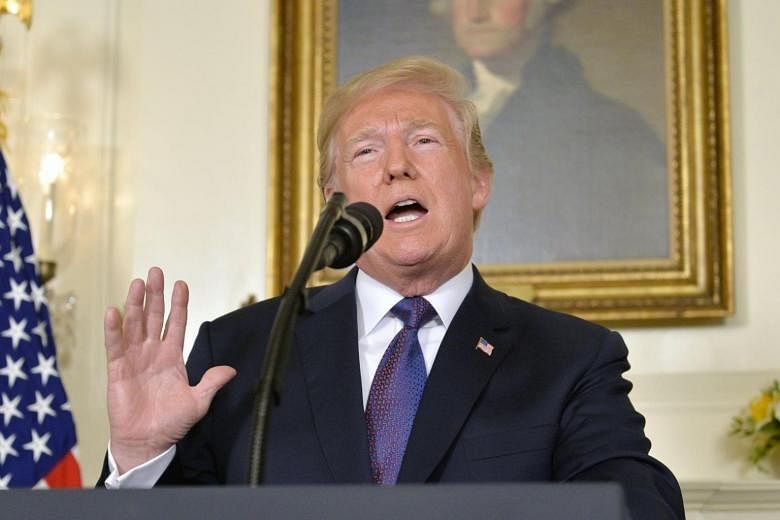WASHINGTON (BLOOMBERG) - US President Donald Trump took the extraordinary step of asking a judge to block his own Justice Department from viewing evidence about his private lawyer seized last week in an FBI raid.
The President on Sunday (April 15) filed court papers seeking to temporarily bar Justice Department prosecutors from reviewing evidence taken during an April 9 raid on the home, office, hotel room, safety-deposit box and phones of the lawyer, Mr Michael Cohen.
Mr Trump's new attorneys argue that much of the material is protected by Mr Trump's attorney-client privilege with Mr Cohen, his long-time private counsel.
They asked that the records not be reviewed by prosecutors and instead be turned over to Mr Cohen's lawyer so the President can see them first.
"The court should order the government to provide Mr Cohen with a complete copy of the seized materials so that the President can review the materials relating to him," his attorney, Ms Joanna Hendon, wrote in an eight-page letter to the judge.
The legal spectacle may get even more bizarre in the coming hours.
On Monday, Mr Trump's new attorneys will appear in Manhattan federal court to join Mr Cohen's request to block prosecutors from using the records for now in their fast-moving criminal investigation of Mr Cohen.
Expected to be present in court as well will be Mr Cohen himself and the adult-film actress Stormy Daniels, who claims she had sex with Mr Trump in 2006 and took a US$130,000 (S$170,547) hush payment days before the 2016 election.
Mr Cohen says he paid the money on his own and wasn't reimbursed.
The legal manoeuvring comes amid US investigations that Mr Trump has assailed as a "witch hunt".
In Washington, Special Counsel Robert Mueller is probing possible ties between the Trump campaign and Russian interference in the 2016 election, while the US attorney in New York has opened an unrelated investigation of Mr Cohen's activities.
The New York Times reported on April 13 that Trump aides consider the Cohen inquiry, which has been under way for several months, to pose the greater threat to the President.
In their court filing on Sunday, Mr Trump's lawyers urged US District Judge Kimba Wood to allow them and Mr Trump to review the material before prosecutors view them and remove any items covered by the attorney-client privilege.
Mr Cohen has made the same request on his own behalf.
At a hearing on Friday, Mr Cohen's lawyers estimated that the evidence seized by the FBI includes "thousands, if not millions" of documents protected by the attorney-client privilege, including communications with Mr Trump and with other Cohen clients not involved in the investigations.
They also invoked the work-product privilege, which protects material prepared by a lawyer in the course of legal representation.
Prosecutors argued in their own filing on Friday that the investigation of Mr Cohen focuses on his private business dealings and that evidence uncovered so far indicates Mr Cohen has done "little to no legal work".
They want a separate group of prosecutors, who are not involved in the Cohen probe, to review the seized documents to weed out any that might be covered by the privilege.
The privilege does not cover communications in furtherance of a crime.
Prosecutors in New York have not said what specifically they're probing, although they said in a court filing that "the crimes being investigated involve acts of concealment by Cohen".
The Washington Post has said prosecutors are investigating possible wire fraud, bank fraud and campaign finance violations.
At Friday's hearing, Judge Wood asked Mr Cohen's lawyer for a list of his clients, which they're expected to present to her on Monday.
Mr Cohen wasn't in court on Friday. Instead, television cameras caught him sitting on a bench outside the Loews Regency Hotel in Manhattan - where the FBI conducted one of the raids on April 9 - chatting with a group of men smoking cigars.
Judge Wood ordered that Mr Cohen appear in court on Monday afternoon, when she is set to resume considering the matter.
In a courtroom sure to be standing-room-only, Mr Cohen will encounter Stormy Daniels, whose real name is Ms Stephanie Clifford, watching from the gallery.
She is suing Mr Trump and Mr Cohen to void a non-disclosure agreement she signed with a company set up by Mr Cohen just before the election.
Mr Trump has denied having had a relationship with Ms Daniels and said he didn't know where Mr Cohen got the money.
Mr Cohen's lawyer has said that Mr Mueller referred some of the evidence uncovered in his investigation to prosecutors in New York.
After the FBI raid on Mr Cohen, Mr Trump stepped up his criticism of Mr Mueller.
His spokeswoman, Ms Sarah Sanders, told reporters that the President has the authority to fire Mr Mueller on his own.
The regulations that created the special counsel say that only the attorney general or his designee can fire the special counsel and only for good cause, such as misconduct, conflict of interest or a violation of Justice Department policies.
Judge Wood was famously nominated for US attorney general by President Bill Clinton in 1993, only to have her nomination withdrawn over revelations that she had employed an undocumented worker.

